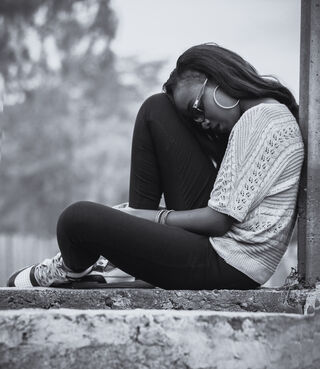Introversion
Will People Be There for You When You Need Them?
Don't let introversion weaken your friendships.
Posted September 22, 2020 Reviewed by Matt Huston

A funny thing happened to me recently.
Not funny ha-ha. Funny how can this possibly be true?
My husband died suddenly of a heart attack in May, a few days before my birthday, a few weeks before our 29th wedding anniversary, a few months before his 60th birthday.
Actually, it’s not funny at all. It’s the absolute worst thing that has ever happened to me—and I had a stem-cell transplant last year.
So what does this have to do with introversion?
Last year I wrote about being sick as an introvert and how challenging it could be to accept all the generous help people wanted to offer. I was grateful to every single friend, but I had my husband looking after me. I could kid myself that I didn’t need them.
Now, in the worst moments of my life, my husband is not here to look after me. And now I need people. A lot.
I haven’t lost the knack of being alone, it’s just become very different now that it’s no longer entirely a choice. Solitude becomes loneliness very quickly if you’re used to having someone come home every evening, having someone to come home to. I know many people live happily alone—I did it myself many years ago. But single people tend to keep in contact with a lot of friends. Married couples, as my colleague Bella DePaulo, author of the Living Single blog, will tell you, tend to get insular; they let friends fall away.
I remember once a few years ago, my husband did not come home when I expected him and didn’t answer his phone or texts. I went into full panic mode and then realized that I could not think of anyone to call to help me cope with what I feared, who would come to the hospital with me if necessary, would help me face terrible news. I had lots of acquaintances, but no close friends nearby.
As it happened that time, my husband was fine. I’d forgotten he had after-work plans, and he’d forgotten his phone. And I vowed to do better with my friendships so that if something terrible ever happened, I would have someone I felt comfortable calling.
This time when my husband didn’t come home and I couldn’t reach him, the story did not have a happy ending. But thankfully, this time I had someone to call, and she came immediately to be with me through the grim immediate aftermath and beyond.
I understand that insularity is practically a trademark of introversion—a feature, not a bug. We don’t need a lot of people; many of us could be content with that one very important person for the rest of our lives.
Except the rest of our lives isn't guaranteed.
Thankfully, people are still rallying around me. Thankfully, people never gave up on me, no matter how introvert-y I've behaved. I think, to some degree, this is because I have been clear about what introversion is and isn’t. My friends speak frequently of my introversion, but they also clearly understand that’s it’s not about not wanting to see them, but about needing downtime for myself. And they tolerate my phone aversion.
The pandemic makes time with friends a little bit exhausting because we can’t just sit on the couch and watch a movie together. We do our visiting outdoors, which means conversation. I love conversation, but I’ve been having a lot of conversation these past few months. I’m about conversated out. Still, these days, too much solitude brings on the boo-hoos, so converse I do, with gratitude.
Believe me, I still get puh-lenty of alone time. All day most days. I recently took a solo road trip, visiting friends who graciously gave me lots of space. I spent a lot of time sitting alone on porches and decks with a view. I took some solo hikes. But it was comforting having friendly faces nearby. They respected my space and I was therefore able to unreservedly enjoy their company when we made time to be together.
I’m talking about a massive, excruciating loss, but what I’m saying here applies to any kind of loss. Divorce happens. Friends move away. Their lives change and they don’t have as much time for us. We drift apart. Children grow up and move on. Parents become elderly and, well, you know … Loss can happen in many different ways—are you prepared?
I know some people reading this will insist that they don’t need anyone, that they’re just fine talking to the cat. More power to them, I guess. I am not an advocate of misanthropy; I believe we all need social connections to be psychologically healthy. (I wonder if the misanthropes among us are rethinking their position after a zillion months of pandemic isolation—we might underestimate the power of the little interactions we all used to have every day, with supermarket checkers, business connections, neighbors.)
I think it’s crucial that we all understand that introversion is not about having no use for people. We are discerning, that is true. We like very particular types of socializing. We need our quiet time. But we are human and we need people.
So please—nurture your introversion but don’t let your social connections wear too thin. Don’t let friendships wither from lack of care. Don’t imagine that everyone will always be around when you need them. Because you never know when you will. Stuff happens.
Facebook image: Jaromir Chalabala/Shutterstock




